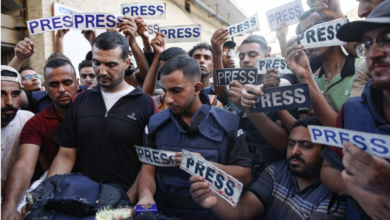Egypt, thanks to the global deterioration in media freedoms, moved upward to be ranked 127th among the 178 countries included in this year's annual global Press Freedom Index. However analysts argue the country remains in a difficult situation.
On Wednesday, the 2010 World Press Freedom Index, issued by the Paris-based Reporters Without Borders, said Egypt has climbed 16 places in just one year; it was ranked 143rd and 146th in 2009 and 2008 respectively.
The ranking reflects the press freedom situation from between 1 September 2009 and 1 September 2010.
The rankings do not take into account the recent crackdown on media outlets in Egypt that has included shutting down several private satellite TV stations on the grounds they violated broadcast procedures.
Reporters Without Borders compiled the index using indicators that measure the freedom that journalists and news organizations enjoy in each country.
The ranking of a country may change from year to year even if its score stays the same, depending on the global trends of deterioration versus improvement in press freedoms.
Egypt was classified by previous reports as an “Internet enemy,” with Egyptian authorities "striving to regain control over bloggers who are more and more organized, despite all the harassment and arrests".
In addition to Egypt's improved ranking, Iraq also climbed 15 places (and is now ranked 130th), because "safety conditions for journalists improved substantially in the country," according to the index.
In contrast, press freedom in the whole Arab region is deteriorating, according to the index.
Three Arab countries–Yemen (170) , Sudan (172) and Syria (173)–are on the list of the world’s ten most repressive countries towards journalists.
"Bahraini’s [sic] ranking in the Index dropped from 119th to 144th place, which can be explained by the growing number of imprisonments and trials, notably against bloggers and netizens," the index pointed out.
The same trend applies to Kuwait, which fell 27 places, from 60th to 87th position.
Iran is a member in the club of the worst countries marked by persecution of the media and a complete lack of news and information.
At the bottom of the list remains North Korea, which occupies 177th place. Eritrea ranks 178.th
Cuba, for the first time since 2003 , is not one of the ten last countries. This is due, above all, to the release of 14 journalists and 22 activists during the course of the past summer, the index stated.
One of the main surprise conclusions of the ninth annual index is a growing deterioration in the press freedom situation in the European Union, where fourteen of the EU’s 27 members have a very low ranking.
Bulgaria and Greece for example, have slipped down to 70th place, and are now on an equal par with the likes of Benin, Comoros and Kenya.
Northwestern Europe and Scandinavia maintain their positions as the world leading countries in terms of press freedoms–a trend that hasn't changed since the index was created in 2002.
Six countries–Finland, Iceland, Netherlands, Norway, Sweden and Switzerland–jointly share first place for the best press freedom practices in the world.




